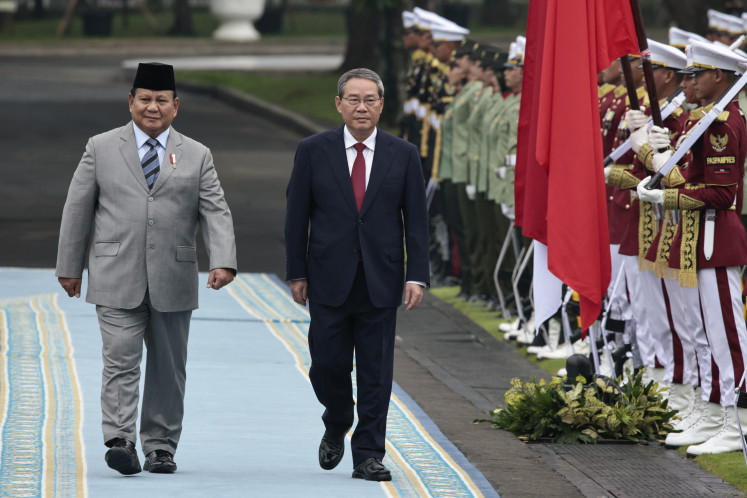Filipinos split three ways on political dynasty
Change text size
Gift Premium Articles
to Anyone
 (Fom left): Vice President Jejomar Binay; Sen. Miriam Defensor-Santiago; Mayor Rodrigo Duterte of southern Davao city; Sen. Grace Poe; and former Interior Secretary Mar Roxas; raise hands after a presidential candidates debate held in southern Cagayan de Oro city, southern Philippines on Feb. 21. (Lyn Rillon/Philippine Daily Inquirer via AP)
(Fom left): Vice President Jejomar Binay; Sen. Miriam Defensor-Santiago; Mayor Rodrigo Duterte of southern Davao city; Sen. Grace Poe; and former Interior Secretary Mar Roxas; raise hands after a presidential candidates debate held in southern Cagayan de Oro city, southern Philippines on Feb. 21. (Lyn Rillon/Philippine Daily Inquirer via AP)
When it comes to political dynasties, public opinion is split almost evenly.
This was one of the findings of the latest Pulse Asia survey in which 1,800 registered voters nationwide were asked face-to-face about election-related issues.
Results of the survey, conducted from Jan. 24 to 28, also showed nearly half of the voters agreeing that the May elections would be clean and the results credible since the counting of votes is automated. Two in every five voters, however, expected cheating during the elections.
The survey had a margin of error of plus or minus 2 percentage points.
Among those surveyed, 32 percent agreed that “one should not vote for candidates who have children, spouses, siblings or parents who are current or former elected government officials.”
Thirty-four percent disagreed, and another 34 percent were undecided.
In March 2013, 40 percent said they did not see anything wrong with electing candidates who belonged to political dynasties, while 28 percent said otherwise, and 31 percent were undecided.
“Public opinion regarding electoral support or nonsupport for politicians belonging to political dynasties is split three ways and is generally unchanged between March 2013 and January 2016,” Pulse Asia said.
The Constitution’s Article II Section 26 prohibits political dynasties “as may be defined by law,” but no legislation has been passed since 1987 to make it operational.
As a result, well-entrenched political families continue to dominate national and local politics.
President Aquino, in his State of the Nation Address last year, deemed one of the priority measures the anti-dynasty bill but Congress failed to pass the measure before it adjourned on Feb. 3 for the election campaign.
A similar distribution of public opinion on political dynasties was seen in Luzon outside Metro Manila, the Visayas, Mindanao and among Classes D and E.
Half of those in Metro Manila disagreed with the view that candidates from political dynasties should not be elected into office while 35 percent among Classes ABC agreed, and 42 percent disagreed.
The survey also found 48 percent of the respondents expecting the elections to be clean and the results credible because of the automation of the vote-counting process, down from 52 percent in March 2013. Fifteen percent doubted the elections would be clean and credible, down from 19 percent three years ago.
Indecision on the matter was more pronounced, from 29 percent in March 2013 to 36 percent in January 2016, according to Pulse Asia.
The survey also asked respondents if they believed cheating would take place during the elections.
Thirty-nine percent said there would be cheating, 29 percent said no cheating would happen and 32 percent were ambivalent.
Among those who expected cheating to occur, 65 percent cited vote-buying as the most likely form of cheating, followed by tampering of the counting machines (37 percent), changing the actual vote count (32 percent), flying voters (31 percent), hoarding voters (25 percent), ballots inserted in the counting machines may be replaced (24 percent), threatening voters and election officers (18 percent), and stolen counting machines (16 percent).






